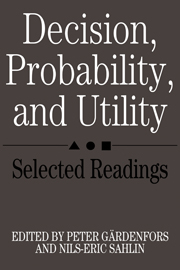Book contents
- Frontmatter
- Contents
- List of contributors
- Preface
- 1 Introduction: Bayesian decision theory – foundations and problems
- Part I Foundations of Bayesian decision theory
- Part II Conceptualization of probability and utility
- 6 Bets and beliefs
- 7 Slightly more realistic personal probability
- 8 Risk aversion as a problem of conjoint measurement
- Part III Questionable rules of rationality
- Part IV Unreliable probabilities
- Part V Causal decision theory
- References
- Name index
- Subject index
8 - Risk aversion as a problem of conjoint measurement
Published online by Cambridge University Press: 05 June 2012
- Frontmatter
- Contents
- List of contributors
- Preface
- 1 Introduction: Bayesian decision theory – foundations and problems
- Part I Foundations of Bayesian decision theory
- Part II Conceptualization of probability and utility
- 6 Bets and beliefs
- 7 Slightly more realistic personal probability
- 8 Risk aversion as a problem of conjoint measurement
- Part III Questionable rules of rationality
- Part IV Unreliable probabilities
- Part V Causal decision theory
- References
- Name index
- Subject index
Summary
A dialogue
Gambler to decision analyst: I would sure like to have a copy of that new book “Speculator's Almanack” by Lit L. Nohn. It received such a favourable review in Portugaliae Oeconomicae.
Decision analyst: You are a lucky man – I incidentally happen to have a few copies with me. In fact, I think I will offer you the following gamble: you have the option of either having one copy for sure or an even chance of getting either no copy or two copies. Which option do you choose?
G: What a silly question! Of course I choose the one copy for sure!
DA: I see. What about if I change the second option to an even chance of getting zero or three copies?
G: Same answer, of course. I can't understand why you ask! I have no more use for a third copy than for a second one.
DA: So you are pretty risk averse then. The expected value of the last option is 1½ copies, as you know, but yet you choose something with an expected value of only one copy. This must be accounted to your aversion to taking risks.
G: Come on, don't be silly! You know me, you know that I am a gambler and that I have a temperament for taking risks. But that has nothing to do with this gamble. It is simply that a second or a third copy of a book is practically useless.
- Type
- Chapter
- Information
- Decision, Probability and UtilitySelected Readings, pp. 136 - 158Publisher: Cambridge University PressPrint publication year: 1988
- 31
- Cited by



